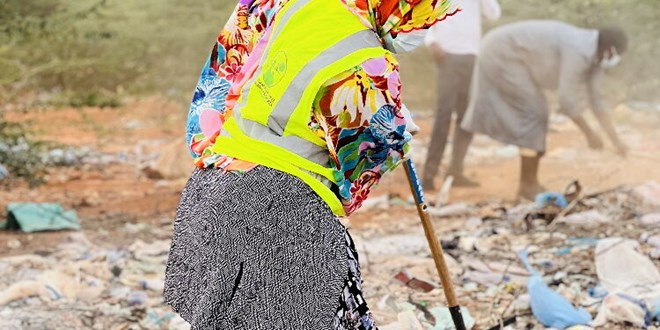
Friday November 4, 2022

Poor and displaced women and men in southern Ethiopia’s Dhagahbur area employed in a local clean-up project/Abdirahman Buuh/Ergo
(ERGO) – A huge clean-up project organised by the local authorities in Dhagahbur is removing rubbish, weeding out the invasive Ali-Garoob tree prevalent in this part of Ethiopia’s Somali Region, and providing vital employment for poor and displaced families.
“I am happy now and I feel encouraged because previously I didn’t have anything,” said Fardowso Sharif Hassan, who is working four days a week on the project earning $50 a month. Her husband is also working with her and earning the same amount.
They used to eat just one meal a day depending for food and water on their neighbours, as Fardowsa’s husband brought in only occasional income from jobs in a quarry.
Now three of their children are in primary school and Fardowsa is proud to be able to buy them what they need as well as pay for extra tuition in language, computers, and religious studies.
“I didn’t know where to go, I couldn’t take them to school or buy them books and pens. Now I am working, and I can be relied upon, I am earning some income!” she said.
According to Abshir Ahmad Farah, the head of the cleaning campaign, 1,352 women and 691 men are employed so far. They focused on hiring women as a survey in Dhagahbur in January found that more women than men earn a living for their families.
The project aims to control the rampant Ali-Garoob trees in the area and build resilience among the most vulnerable families to help them stand on their feet economically. Up to four people per household are able to enrol in the work scheme.
At the end of the three-year contract, each worker is to receive $600 to invest in setting up a small business. “They can choose whatever job they want, such as turning to livestock or farming. We hope to help them integrate into the economy and build resilience among their families,” Abshir said.
Fardowsa and her husband are already saving $20 a month to invest in her business venture in the future. “I hope to open a business selling supplies including sugar and flour and whatever else people need, and that’s when my morale will be back and many people will be depending on me.”
Also working on the project is Fowsiya Salad Omar, who was displaced from Tuliguleed village in 2018 by conflict between the Somali and Oromo communities. She is very glad to earn $50 from the cleaning work.
“We were among the most vulnerable people, but I now can get food from local stores and pay back when I get my wages,” she said.
She is still concerned about their poor shelter on the outskirts of Dhagahbur where she lives with her elderly husband and seven children.
“There is flood water flowing at night and sometimes pouring into our house. We have children in the house and if you saw our situation, you would be alarmed!” she said.